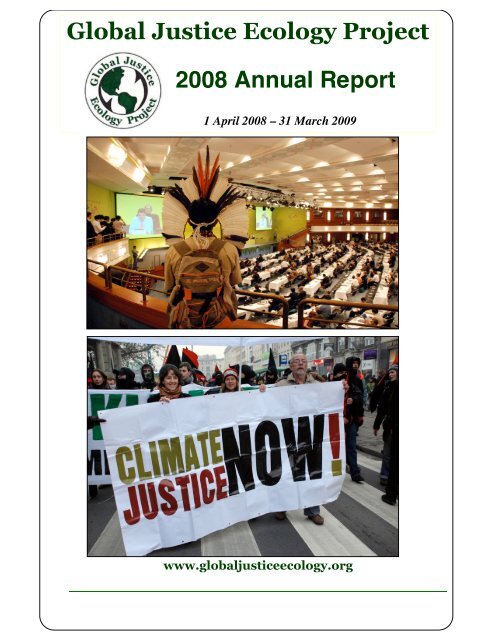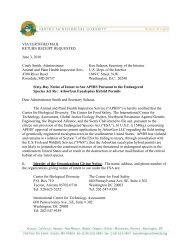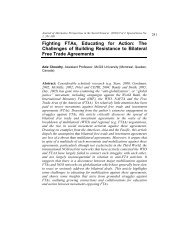annual report 2008 (compressed).pdf - Global Justice Ecology Project
annual report 2008 (compressed).pdf - Global Justice Ecology Project
annual report 2008 (compressed).pdf - Global Justice Ecology Project
Create successful ePaper yourself
Turn your PDF publications into a flip-book with our unique Google optimized e-Paper software.
<strong>Global</strong> <strong>Justice</strong> <strong>Ecology</strong> <strong>Project</strong><strong>2008</strong> Annual Report1 April <strong>2008</strong> – 31 March 2009www.globaljusticeecology.org
the most polluting industry through the U.S.Climate Action Partnership. Rising Tide thenawarded EDF with a giant green paintbrushfor their role in helping dirty industry portraythemselves as environmentally friendly. Theaction received widespread media coverage.<strong>Global</strong> <strong>Justice</strong> <strong>Ecology</strong> <strong>Project</strong> Celebrates 5 Years of Action | <strong>2008</strong> Annual Report www.globaljusticeecology.orgPowershift - Washington, DC (February ’09)Orin traveled to Washington, DC with ourallies from IEN and Rising Tide forPowershift, a major national gathering ofyouth activists regarding climate change. HeEnvironmental Defense Fund “<strong>Global</strong>Warming Crime Scene.” Photo: courtesyRising Tide NAspoke at major workshops about the need to mobilize action for climate justicearound the Copenhagen Climate negotiations twice over the two days to morethan 1,000 people. Tom Goldtooth from Indigenous Environmental Networkand Bill McKibbon were two of the other panelists. He also helped pulltogether a Mobilization for Climate <strong>Justice</strong> meeting where interested studentsand activists discussed actions around Copenhagen.GJEP Organizing for Climate <strong>Justice</strong> Internationally:Press Conference on False Solutions to Climate Change, UN Conventionon Biological Diversity, Bonn, Germany (May ’08)GJEP and other organizations working for climate justice held a pressconference during the UN CBD’s bi-<strong>annual</strong> Conference to accuse the CBD ofincreasingly allowing itself to be influenced by business, at the expenseecosystems, biodiversity and indigenous and local communities. The undueinfluence of industry at the CBD has led to numerous proposals for the CBD toadopt patently false solutions to climate change, such as agrofuels (industrialscale biofuels), that perpetuate biodiversity destruction, exacerbate climatechaos and erode the rights of women, communities and Indigenous Peoples.UN Food & Agriculture Organization Food Summit, Rome, Italy (June ’08)Immediately following the CBD in Bonn, Rachel attended the UNFAO highlevel summit on food and bioenergy in Rome, as well as the simultaneouslyorganized civil society forum "Terra Preta.” The Terra Preta gathering issued acall for food sovereignty and a moratorium on agrofuels, while inside the FAOFood Summit, the push for expanding industrial agricultural was strong, andaddressing the responsibility of agrofuels in the worsening food crisis wasignored. GJEP and other groups initiated a protest within the FAO summitwhich highlighted the skyrocketing profits of agribusiness/ biotech/fertilizerindustries, while the food crisis pushed billions into starvation.5
International Climate <strong>Justice</strong> Meeting, Copenhagen (September ’08)In September, Anne and Orin attended the first international strategy andmobilization session to discuss organizing a large-scale mobilization around theupcoming 2009 UN Climate Convention.The meeting brought together over 100 activistsfrom 21 countries and resulted in a unanimouslyagreed upon Call to Action for climate justice andagainst business as usual. It has been translatedinto 19 languages and is being disseminatedthroughout the world as the movement continuesto grow. Anne attended a follow-up meeting inCopenhagen in March 2009, which furthered themass action organizing. Actions are being calledfor both during the UN climate meeting inDecember 2009 as well as on 30 November 2009,in commemoration of the tenth anniversary of theWTO shutdown in Seattle, WA, where diversemovements came together to demonstrate thepower of unified action.International Union for the Conservation ofNature Annual Conference, Barcelona, Spain(October ’08)Climate change protested at a rallyduring the European Social Forum,Malmo, Sweden, Photo:Langelle/GJEP-GFCOrin attended the <strong>annual</strong> IUCN conference in his role as Media Coordinator for<strong>Global</strong> Forest Coalition, to coordinate media for the release of Life asCommerce – GFC’s <strong>report</strong> which critiques and challenges market-basedmechanisms for conservation. He also attended the event as a presscorrespondent for Z Magazine, and networked with press throughout the event.UN Climate Convention, Poznan, PolandAnne and Orin attended the UN Climate negotiations in Poznan, Poland inDecember <strong>2008</strong> where they collaborated with <strong>Global</strong> Forest Coalition, Climate<strong>Justice</strong> Now!, Indigenous Peoples Organizations, and social movements onevents and strategies at the conference designed to advance climate justice.Following the conference, Anne and Orin co-authored and published an articleon the climate negotiations in the February 2009 edition of Z Magazine titled“UN Climate Convention.” Activities at the UN climate convention included:<strong>Global</strong> <strong>Justice</strong> <strong>Ecology</strong> <strong>Project</strong> Celebrates 5 Years of Action | <strong>2008</strong> Annual Report www.globaljusticeecology.org6
Carbon Karma Fortune-telling Action Foretells REDD Profits<strong>Global</strong> Forest Coalition, The Wilderness Society, <strong>Global</strong> <strong>Justice</strong> <strong>Ecology</strong><strong>Project</strong> and concerned youth highlighted the risks associated with theimplementation of the Reducing Emissions from Deforestation and ForestDegradation (REDD) scheme in a "REDD fortune-telling" action at the UNClimate convention. The action exposed the fact that the inclusion of forests inthe carbon market will mainly benefit the countries and actors that have causedmost of the world's deforestation (who will be paid to reduce theirdeforestation), while the countries that have successfully conserved their forestswill be left out (countries cannot be paid to reduce deforestation if they are notdoing it). This is leading some countries to massively increase logging so thatthey will be paid more to reduce it after REDD is enacted. Other risks ofREDD include the promotion of tree plantations (the UN makes no distinctionbetween natural forest and monoculture or GE tree plantations) and thedisplacement of indigenous peoples from their ancestral lands.<strong>Global</strong> Day of Action Marches Against Climate ChangeGJEP marched in the <strong>annual</strong> <strong>Global</strong> Day of Action along with numerousorganizations in the Climate <strong>Justice</strong> Now! network. See bottom cover photo.<strong>Global</strong> <strong>Justice</strong> <strong>Ecology</strong> <strong>Project</strong> Celebrates 5 Years of Action | <strong>2008</strong> Annual Report www.globaljusticeecology.orgIndigenous Peoples Protest REDDWhen the U.S., Canada,Australia and New Zealandinsisted that all referencesto Indigenous rights andthe UN Declaration on theRights of IndigenousPeoples be eliminated fromthe Reducing Emissionsfrom Deforestation andForest Degradation(REDD) agreement, astatement of protest wasissued by IndigenousPeoples Organ-izations,who walked out of theproceedings and held aspontaneous demonstration.Indigenous Peoples at the UN Climate Convention in Poznan,Poland stage a spontaneous protest against the removal ofindigenous rights from the text on REDD (Reducing Emissionsfrom Deforestation). Photo: Langelle/GJEP-GFCGJEP supported this demonstration and helped rally the media to ensure theycovered it.7
REDD, Biofuels and GE Trees Side EventGJEP and <strong>Global</strong> Forest Coalition (GFC) organized a side event at the UNClimate COP to expose the links between and impacts of geneticallyengineered trees, industrial timber plantations, the REDD scheme and biochar(a geo-engineering scheme that involves burning vast expanses of trees to turninto charcoal, which is then buried to supposedly store the carbon). Speakersincluded Guadalupe Rodriguez, of Rettet den Regenwald, Marcial Arias ofGFC and Anne Petermann of GJEP and GFC. 45 participants attended theevent including NGO representatives, scientists, consultants and delegates.UN Definition of Forests Press Conference<strong>Global</strong> <strong>Justice</strong> <strong>Ecology</strong> <strong>Project</strong> joined <strong>Global</strong> Forest Coalition, The WildernessSociety-Australia, the Pacific Indigenous Peoples Environmental Coalition andVia Campesina to challenge the UN’s official definition of forests. The UNdefinition of forests is so vague as to include industrial timber plantations.Plantations are not forests, however. Forests are biodiverse ecosystems and arecritical for climate stabilization. The UN definition endangers Indigenous andother forest-dependent Peoples, peasants, small farmers and biodiversity, whileexacerbating climate change. The groups demanded the UN change thedefinition of forests so as to acknowledge their critical role, and to distinguishthem from timber plantations.Climate <strong>Justice</strong> Now! Releases StatementMembers of the Climate <strong>Justice</strong> Now! network—representing over 160organizations fighting for climate justice, including GJEP—issued a jointstatement calling for a radical change in direction to put climate justice andpeople's rights at the center of the UNFCCC negotiations. The statementasserts that: "Solutions to the climate crisis will not come from industrialisedcountries and big business. Effective and enduring solutions will come fromthose who have protected the environment - Indigenous Peoples, women,peasant and family farmers, fisherfolk, forest dependent communities, youthand marginalised and affected communities in the global South and North."You can read the entire statement on the GJEP website by going to:http://www.globaljusticeecology.org/connections.php?ID=232New Voices on Climate Change Initiative LaunchedAs the United Nations climate negotiations got underway, GJEP launched NewVoices on Climate Change, a new initiative designed to broaden the climatedebate, especially in the U.S., by amplifying the voices of people around theworld who are already being impacted by climate change. New Voices is aneffort to highlight the views of people that have historically been excluded from<strong>Global</strong> <strong>Justice</strong> <strong>Ecology</strong> <strong>Project</strong> Celebrates 5 Years of Action | <strong>2008</strong> Annual Report www.globaljusticeecology.org8
climate discussions: especially Indigenous Peoples, women, and people ofcolor. In so doing, the New Voices initiative will help build the climate justicemovement in North America by humanizing and personalizing climate change,an often daunting, disempowering and abstract problem, in order to help peoplebetter understand the real human impacts of climate change, and therebyempower people to become involved.New Voices on Climate Change includes both an aggressive media campaign toconnect mainstream and alternative media with individuals representingcommunities impacted by climate change, and speaking tours to connect NewVoices directly with U.S. audiences.<strong>Global</strong> <strong>Justice</strong> <strong>Ecology</strong> <strong>Project</strong> Celebrates 5 Years of Action | <strong>2008</strong> Annual Report www.globaljusticeecology.orgAnna Pinto, one of GJEP!s “New Voices,” speaksto the media in Poznan, Poland during the UNClimate Conference. Photo: Langelle/ GJEP-GFC<strong>Global</strong> <strong>Justice</strong> <strong>Ecology</strong> <strong>Project</strong> Co-Director/ Strategist Orin Langelle saysof New Voices: "As the internationalfinancial crisis intensifies, the majorityof official bodies dealing with climatechange, especially at the UN level, arecontinuing to promote market-basedapproaches to ‘solve’ the climate crisisthat are geared primarily to corporateprofit. New Voices was created becauseit is urgent that we hear new perspectivesfrom people who have a differentmessage. Life on Earth is being threatened by climate chaos and we must notallow life to be commodified or let the market decide our fate."New Voices currently has participants from Aotearoa (New Zealand), Brazil,Canada, India, Indonesia, Paraguay, the Philippines, Samoa, South Africa,Tanzania, the U.S., and Uruguay.Stop GE Trees Campaign AchievementsThe industry push to develop genetically engineered (GE) trees continues toincrease globally. The clamor for so-called ‘second-generation’ agrofuels,made from cellulosic feedstocks like trees, continues to rapidly drive GE treeresearch and development. Industry is attempting to frame GE trees under thebanner of climate change mitigation and green technology. The devastatingimpacts on forests and communities caused by the release of GE trees are beingignored and downplayed. The Stop GE Trees Campaign, facilitated by GJEP,organizes to protect forests and communities by preventing the release ofgenetically engineered trees into the environment.9
Synthetic Biology Teach-In, Washington, DC (April ’08)Anne Petermann, Orin Langelle and Rachel Smolker were invited to participatein a teach-in on synthetic biology and the "bioeconomy" organized by the ETCGroup. Anne and Rachel presented on industry plans to use completelysynthetic organisms to create enzymes capable of digesting GE trees andturning them into agrofuels (industrial-scale biofuels), plastics and chemicals.Rachel pointed out that the quantity of cellulose that would be required tomanufacture all of these products, on top of the existing demand for woodproducts, would require several planets' worth of trees. Anne explained thedeadly ramifications that this massively increasing demand for trees wouldhave on both forests and forest-dependent peoples all over the world.UN Permanent Forum on Indigenous Issues, New York, NY (April ’08)Anne and Orin attended the UN Permanent Forum on Indigenous Issues wherethey networked with Indigenous Peoples Organizations from around the worldabout the dangers of genetically engineered trees and wood-based agrofuels,plus other false solutions to climate change (like “clean” coal). They presenteda workshop titled "Wood-BasedBiofuels and Genetically EngineeredTrees: Impacts on Forests and Forest-Dependent Peoples," co-sponsored by<strong>Global</strong> Forest Coalition, to over 40participants.Indigenous Environmental Network protestsagainst plans by Sythe <strong>Global</strong> to mine for coal onindigenous lands. Photo: Langelle/GJEP-GFCUN Biodiversity Convention in Bonn,Germany (May ’08)<strong>Global</strong> <strong>Justice</strong> <strong>Ecology</strong> <strong>Project</strong> and theSTOP GE Trees Campaign made amajor impact at the UN Convention onBiological Diversity’s Ninth Conferenceof the Parties in May <strong>2008</strong>. Through ourhard work, one of the topics on theagenda of the assembly of UN delegateswas a global suspension of any futureplantings of GE trees. The deck at theCBD, however, was unfortunatelystacked against us, with GE tree industrypeople participating as members of official government delegations. This madeit impossible for us to win a global ban on the release of GE trees, though wewere successful in the CBD issuing strong language regarding the potentialrisks of GE trees. Industry researchers were so dismayed by our work at theCBD, they wrote an article that was published in Nature Biotechnologyentitled, “Forest Biotechnology, Strangled at Birth?” You can access this<strong>Global</strong> <strong>Justice</strong> <strong>Ecology</strong> <strong>Project</strong> Celebrates 5 Years of Action | <strong>2008</strong> Annual Report www.globaljusticeecology.org10
article through our website (under ‘GE TreesIn the News). The article laments the work ofthe international movement to stop GE treesand specifically names <strong>Global</strong> <strong>Justice</strong> <strong>Ecology</strong><strong>Project</strong> and Executive Director AnnePetermann, as some of the main culprits.<strong>Global</strong> <strong>Justice</strong> <strong>Ecology</strong> <strong>Project</strong> Celebrates 5 Years of Action | <strong>2008</strong> Annual Report www.globaljusticeecology.org11During the CBD, we facilitated and organizedpress conferences, as well as variousworkshops and side events both inside andoutside of the official CBD meetings. Ourpanels included foresters, scientists andindigenous peoples, and examined the impactsof genetically engineered trees on forestbiodiversity and forest dependent communities, Frankentrees invade the UNConvention on Biological Diversity inand also addressed the threats from use of GEBonn, Germany. Photo: Langelle/trees for second generation agrofuels. GE tree GJEP-GFCscientists who attended our side events werehighly incensed by our detailed information on the predicted social andenvironmental impacts of GE trees. They argued that the impacts of theimplementation of the technology had nothing to do with the technology itself,which should be considered in isolation. “The science of GE trees has nothingto do with how GE trees are used,” was their rationale.Grassroots Presentations on GE Trees and Second Generation Agrofuels• Women's International League for Peace & Freedom <strong>annual</strong> northeastern USgathering in Rochester, VT (July ’08)• IEN Protecting Mother Earth Gathering, Elko, NV (July ’08)• Rising Tide Northeast Climate Confluence, Catskills, NY (July ’08)• Rising Tide Southeast Climate Confluence, Richmond, VA (August ’08)Agrofuels Industry Conference, Raleigh, NC (September ’08)Rachel attended an industry conference on agrofuels to gather information onindustry plans, including using the U.S. Southeast as the ‘New Middle East’ forenergy by promoting the growth of second-generation agrofuels productionincluding establishing large-scale GE tree plantations.European Social Forum, Malmo, Sweden (September ’08)Following the international climate justice meeting in Copenhagen, Orin andAnne attended the European Social Forum across the river in Sweden where
they participated in an agrofuels strategy meeting, presented on the dangers ofsecond-generation cellulosic agrofuels and GE trees.GE Papaya Release in the U.S. (November ’08)In November, the STOP GE Trees Campaign collected and submittedcomments to the USDA concerning an industry petition for the commercialrelease of GE papaya in Florida. Many organizations came together withscientists, businesses, organic farmers, beekeepers and others to oppose thisproposal. Over 12,000 people opposed the commercialization while only 17people submitted statements supporting the commercialization of GE papaya.World Social Forum - Belem, Brazil (January ’09)Anne and Orin attended the World Social Forum where they participated inpanels on GE trees, water privatization, second-generation agrofuels andindigenous rights, especially as they relate to climate change. They also metwith their allies from Climate <strong>Justice</strong> Now! about the global mobilization ofactions around the Copenhagen climate talks, and helped draft the Climate<strong>Justice</strong> Now! Declaration.Indigenous Peoples from all over Amazonia attended the World Social Forum in Belém, Brazil to callattention to the ongoing destruction of their homeland.Photo: Langelle/GJEP-GFC.Agrofuels Sign-On Letter (January ’09)<strong>Global</strong> <strong>Justice</strong> <strong>Ecology</strong> <strong>Project</strong> Celebrates 5 Years of Action | <strong>2008</strong> Annual Report www.globaljusticeecology.org12
In January, GJEP collaborated with organizations nationwide on an open signonletter comprehensively criticizing agrofuels and promoting alternatives thatprovide real solutions to climate change.Stop GE Trees Campaign Strategy Development (January ’09)In 2009, GJEP began strategizing with the member groups of the STOP GETrees Campaign about building a campaign to stop the commercialization ofthe first GE “forest” tree in the U.S.--a GE cold tolerant eucalyptus. GE treegiant ArborGen has petitioned the government to legalize GE eucalyptus, forplantations across the U.S. south. Eucalyptus plantations are incredibly waterintensive, pose a serious wildfire danger, and are highly invasive.Talk at Southern Hemisphere <strong>Global</strong> Forest Coalition, Asunción,Paraguay (February ’09)Following the WSF, Orin and Anne traveled to Paraguay to meet with alliesabout building the Latin America campaign against GE trees. Anne spoke onthe dangers of GE trees and second-generation agrofuels to representativesfrom several prominent environmental and human rights groups based inAsunción, Paraguay.<strong>Global</strong> <strong>Justice</strong> <strong>Ecology</strong> <strong>Project</strong> Celebrates 5 Years of Action | <strong>2008</strong> Annual Report www.globaljusticeecology.orgEarth Land and Water Conference (ELAW), Eugene, OR (March ’09)Anne attended the 2009 <strong>annual</strong> ELAW conference where she presented on GEeucalyptus plantations as a false solution to climate change. She also worked torecruit lawyers and scientists at the conference for the campaign to stop therelease of destructive genetically engineered eucalyptus in the US.GJEP Achievements in VermontChristian Parenti on <strong>Global</strong> Warming (April ’08)On April 8, <strong>Global</strong> <strong>Justice</strong> <strong>Ecology</strong> <strong>Project</strong> cosponsoreda talk on global warming put on by theWill Miller Social <strong>Justice</strong> Lecture Series inBurlington, VT. International journalist ChristianParenti spoke on the topic of Climate War: theViolent Geography of <strong>Global</strong> Warming, where hedescribed how global conflict is being and will beexacerbated by climate change. In particular, whenpeople are displaced due to droughts and floods andmove onto lands controlled by other peoples,conflicts over that land are bound to ensue.Christian Parenti speaksabout the threats posed byclimate change. Photo:Langelle/GJEP13
GJEP Celebrates 5 Year Anniversary! (September ’08)On September 5 th , <strong>Global</strong> <strong>Justice</strong> <strong>Ecology</strong> <strong>Project</strong> celebrated five years ofaccomplishments with a party at the GJEP office. Supporters from ourcommunity as well as GJEP staff and Board members joined together for thefiesta and photo slideshow of GJEP’s work over the years.Leticia Galeano of Movimiento Agrario y Popular Speaks (October ’08)In October, GJEP co-hosted an event with Leticia Galeano, who visitedBurlington from Paraguay as a part of a speaking tour through the eastern U.S.to raise awareness about the devastating impacts of soya expansion inParaguay. The tour was organized by Rainforest Action Network, TowardFreedom, and Upsidedown World. She spoke about her community'sexperiences with the horrific effects of the agro-toxins sprayed on the soyfields, and about the need for local, sustainable family farming as the bestviable alternative to the toxic agribusiness model.Vermont Environmental Conferences (November / December ’08)In November, Rachel attended the Environmental Action conference inRandolph, VT, where she spoke about the threats of false solutions to climatechange that have been gaining momentum in the broader public during adiscussion on biomass and energy. In December, Colette Oesterle, GJEP’sformer Media/Campaigns Organizer, attended the Community-BasedApproaches to Energy/Climate Change Conference in Randolph, VT, whereshe gathered information about some of the local approaches to solving climatechange, and distributed GJEP’s literature on the dangers of agrofuels, and onactions being mobilized to tackle climate change.GJEP Explores Sustainability & the Local Foods Movement (December ’08)In December, GJEP hosted an evening of discussing and eating local food,beginning with the film Sustainable Table: What's on Your Plate? inHinesburg. Following the film, local foods expert Bill Schubart and chair ofHinesburg’s “Buy Local and Specialty Farming Task Force” led a discussionwhich took a closer look into what the future of food could look like inVermont. A tasting of apples and cheeses from the Hinesburg area finished offthe evening.GJEP Local Event: Is Nuclear Power Dangerous to Your Health?In February, GJEP organized a local presentation on the effects of NuclearPower Facilities on the health of surrounding communities. Dr. WinfridEisenberg, a German pediatrician, <strong>report</strong>ed on the recently published Germanstudy on childhood cancer in the vicinity of nuclear power plants, whichexposed the increased risk of leukemia in children under 5 years old who livenear nuclear power plants.<strong>Global</strong> <strong>Justice</strong> <strong>Ecology</strong> <strong>Project</strong> Celebrates 5 Years of Action | <strong>2008</strong> Annual Report www.globaljusticeecology.org14
University LecturesAnne and Orin guest lectured over the fall and spring semesters at both the theRadical Environmentalism class at the University of Vermont, and theInterpreting <strong>Global</strong> Issues class at the Community College of Vermont. Theycovered topics including the international and growing domestic movementsfor climate justice, as well as corporate globalization and the roots of theclimate crisis.<strong>Global</strong> <strong>Justice</strong> <strong>Ecology</strong> <strong>Project</strong> Celebrates 5 Years of Action | <strong>2008</strong> Annual Report www.globaljusticeecology.orgGJEP International Media CampaignIn <strong>2008</strong>, GJEP launched an aggressive campaign to highlight our issues in themedia, through a subscription to Green Media Toolshed. While Colette workedon compiling media contacts, Orin focused on developing personal workingrelationships with <strong>report</strong>ers and journalists, which helps ensure more and bettercoverage of our issues. In this effort, GJEP has had major success withDeutche Welle, The Guardian, the UK Telegraph, National Public Radio,Pacifica, the Institute for Public Accuracy, Al Jazeera and The Huntington Post,as well as with various media bloggers. This concentrated media effort hashelped us reach millions of people with our views on climate justice,Indigenous Rights and the protection of forests.During the UN Climate Convention in Poznan, Orin worked with MikeShanahan from the International Institute for Environment and Developmentand Rod Harbinson from the Panos Institute to promote our New Voicesspeakers to developing country journalists, as well as with the Institute forPublic Accuracy. They were given a list of GJEP’s New Voices speakers whowould be attending the COP, which they in turn sent out to all the mediaattending the COP. This led to many interviews with New Voices participantsand helped to amplify their stories through hundreds of newspaper articles andradio interviews.GJEP continues to be a resource for media as well as for allied organizations interms of content and issue analysis. GJEP staff Orin Langelle, AnnePetermann, and Rachel Smolker gave numerous interviews throughout the yearto dozens of media outlets and <strong>report</strong>ers.Now, with the climate justice movement building both nationally andinternationally towards a mass mobilization around the upcoming UN ClimateCOP in Copenhagen, GJEP is actively involved in developing strategic andunified messaging as well as alliance building to project the important messageof climate justice as broadly as possible.15
Ayoreo Community of the Chaco, ParaguayLangelle, by invitation of the Ayoreo community from the settlement CampoLoro (parrot field), traveled with Dr. Miguel Lovera, who works with <strong>Global</strong>Forest Coalition and Iniciativa Amotocodie. The photos Langelle took werecalled "Sharing the Eye,” and depict the community through the eyes of itsresidents. An exhibit of his photographs were given to the Ayoreo people ofCampo Loro and have been posted on the GJEP Photo Gallery.Campo Loro is a 10,000 hectare field that was given to the Ayoreo in exchangefor their nomadic realm of over 10 million hectares. The Ayoreo were themasters of the harsh northern Chaco territory. They lived off hunting andgathering and were fierce warriors. Because they posed a threat to theexpansion of white "civilization," they were forced into settlements in the1970s. The subhuman confinement conditions, which subdued these proudwarrior people, depleted their self-esteem. Their unemployment rate was over50%. The Ayoreo that were put into settlements are now regaining theirdignity through the recovery of their culture and territorial rights through theorganizing work of the Union of Native Ayoreo of Paraguay (UNAP).<strong>Global</strong> <strong>Justice</strong> <strong>Ecology</strong> <strong>Project</strong> Celebrates 5 Years of Action | <strong>2008</strong> Annual Report www.globaljusticeecology.orgGJEP supports the work of Iniciativa Amotocodie and UNAP's to recover theAyoreo culture and territorial rights. GJEP also supports the IndigenousPeoples of the Gran Chaco region who have eluded "civilization" and are not incaptivity. For more information on how you can support their struggle, pleasego to: http://www.globaljusticeecology.org/connections.php?ID=25317Ayoreo mother and child in Campo Loro, in the Gran Chaco region of Paraguay. This was GJEP!sPhoto of the Month in March. Photo: Langelle/GJEP-GFC
GJEP Photo-of-the-Month SeriesIn January, GJEP began an online Photo-of-the-Month series featuring imagesfrom Langelle’s photo library that highlight critical issues. The series is meantto draw attention to subjects and struggles while providing our listservmembers with an activist tool that they can easily share with friends,colleagues, and family to continue raising awareness and educating people. Ifyou would like to receive GJEP’s Photo-of-the-Month email, you can sign upto our listserv on our website by clicking on the Join our listserv button andfilling out the form, or by emailing Aja at aja@globaljusticeecology.org.Native Solutions to Conservation Refugees (NSCoRe)Native Solutions to Conservation Refugees (NSCoRe) is a fiscally sponsoredproject of <strong>Global</strong> <strong>Justice</strong> <strong>Ecology</strong> <strong>Project</strong>. NSCoRe has advocated for therights of the local communities in and around the Omo Park in Ethiopia sinceJanuary, 2006. Native Solutions to Conservation Refugees' mission is torespond to Indigenous and local communities' wishes when colonial“conservation” efforts threaten to displace them. In fiscal year <strong>2008</strong>, directorWill Hurd continued to work with the Mursi, helping to map out their territoryso as to better protect various sites of cultural significance. NSCoRe issupporting the Mursi effort to live peacefully and sustainably as the officialcaretakers of their lands, and will continue to work with the community toachieve these goals.<strong>Global</strong> <strong>Justice</strong> <strong>Ecology</strong> <strong>Project</strong> Celebrates 5 Years of Action | <strong>2008</strong> Annual Report www.globaljusticeecology.orgAutumn morning, Weller Pond, Adirondack State Park, New York, 9/08. Photo: Langelle18







